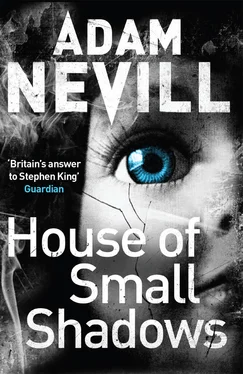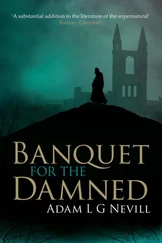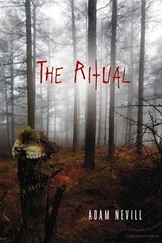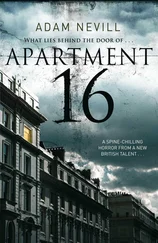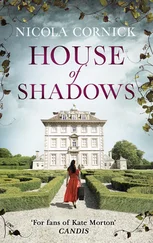She remembered she had been stood before a window looking at the children in the garden. Then she had come back to Edith’s bedroom and fallen upon the bed, where she must have passed out… but she hadn’t passed out on this bed.
What came after her return to the room was vague, or receded to fragments, and no matter how hard she swiped at the pieces of memory they mostly sought oblivion. Perhaps mercifully. Because there had been a commotion. A rushing of small feet towards the room. And then inside the room there had been a bustling. The activity had been all about her face, accompanied by the smell of old clothes, of neglect, and fresh earth, winter air. She remembered the sounds and the smells… had a wooden face pressed itself close? And then…
Nothing.
Bits of another bad dream between other bad dreams.
She must have dreamt that she had seen children in the garden, wearing masks, but looking up at the window she peered through. Before that there had been another dream of the Red House filled with sunlight, the perfume of flowers. People had waited for her in the garden.
All of this must have been part of a trance. Imagined. She’d had two trances then. Or three? Or one so powerful it had felt like several. She didn’t know because the passage from one place to another, and now to here, was less like waking from a deep sleep filled with vivid, urgent dreams and more like waking into a new day, with the actual memories of the last time she was conscious quickly fading.
It was not possible for such hallucinations to feel like actual memories. Her visions were delusions. That was one thing she must not kid herself about.
In the reeking darkness of the strange room, she was too stiff with fright to move. So she remained motionless, no less inert than a doll, but one filled with horror. Until the terror subsided and she thought she had been emptied of the capacity to feel anything.
Her skin was cold as if she’d been exposed to the elements all night, or even longer. But though she was cold the sensation wasn’t one of physical discomfort.
Shock also rendered her unable to speak, or even cry out. Thick-headed, she could have been mistaken for thinking she hadn’t slept in weeks, or maybe she’d slept for weeks and only half awoken.
She pinched her wrist. As she performed the simple manoeuvre her arms were numb, heavy, cold, her fingers thick, half paralysed. But she was awake. This was real.
A thin cut on her forearm poked beneath her sleeve, and had recently begun to scab over.
She could not see the scalpel or any bedclothes. And what was she lying on? Bare springs, because there was no mattress.
In the vague light that passed through the boarded-up window she could also see that she had been changed into a garment that looked and felt like a dress. Even her throat was covered by something tight, a stiff collar. The gown reached her ankles and she could feel its constriction about her hips. The garment was old. What she could see of it was grubby, once white.
The light was dim, but she was also certain there were no dolls on the far wall, or furniture in the room. Where they ended their journey, the shards of white daylight struck unclean walls.
So had she been drugged, which had made her imagine everything? She couldn’t accept that, her recollections of the house and all that had happened were too sharp, too vital.
While she was unconscious her clothes must have been changed, and someone had left her sitting on bare metal springs, slumped against a metal headboard. But inside a new place, another building, or maybe in a part of the Red House she had never seen before. Or the physical world had been transformed again, and in a manner more radical than ever before.
The idea that she was still inside the Red House, and still in Edith Mason’s bedroom, and lying upon her actual bed, grew through her bewilderment and close to a horrible acceptance of the impossible. And if she needed prompt confirmation, beside the bed was a great black wheelchair, tipped on its side upon the bare wooden floor.
Gradually, her eyes adjusted to the darkness. Mould blackened the walls she could see lit up by bands of watery daylight. And that’s what she could smell. She recalled noticing the same odours before, in the darkness of her room, in the corridor outside her room, and inside the dining room.
Most of the remaining wallpaper was mottled into neglect. Leaves and loose bricks lay upon the floorboards. Part of the ceiling had fallen in too, because slats of wood were visible. The wiring had been stripped from the walls. A decomposing mattress was slumped against where she remembered a mirror to be. Continents of black stains had joined up on the mattress. Parts of the fabric and stuffing formed wet lumps on the floor.
She clutched her face with hands so cold and heavy they felt like they belonged to someone else, or were, at the very least, near paralysed. Her features were slippery with some kind of cream or ointment. She looked at the sleeve of the ancient white nightgown from which an unfamiliar perfume drifted. Gingerly, she touched her head. Her hair was pinned up inside a cap across which her numb fingers scraped.
On the floor beside the bed were shards of mirrored glass, smashed out of a frame many years before and now glimmering among the detritus. With a slow and ungainly arm, she reached down and picked up the closest piece, breaking it free from a rime of dust and a glimmer of silvery insect trails. She rubbed the section of dull speckled glass with a thumb. Turned it to her face. And stared at the sight of something so pale it was almost blue. Whitened skin, her skin.
From outside came a sound she never thought she would hear again. The rumble of a car engine and the ripple-pop of tyres across a rough surface. Beyond the sound of the car birds issued terse cries into the cool air.
Stepping off the bed took all of her strength. For a moment she’d thought she was fastened to it. But once she was up and on her ungainly feet, moving was much easier than the act of pinching her flesh, or picking up the broken piece of mirror. Now she was upright she even felt agile, nimble.
Through the unlit room her legs carried her swiftly across the dross and wet bricks to the blocked window. Frantically, she moved her face behind the rough, damp-darkened boards until she found a suitable gap to peer through.
A vehicle came into view. A green van, an old model, even vintage, that was driven carefully. It stopped moving at the end of the overgrown front garden. An area now protected by a metal chainlink fence she had never seen before. Most of the brick wall she remembered was missing.
The sight of the man who stepped out of the car made her dizzy, and then relieved, and then close to paralysis.
Without the aid of his wheelchair, Leonard Osberne stood beside the open driver’s-side door. He then walked stiffly around the bonnet of this vehicle she had never seen before, and stood before the fence.
He held something in his hands, something black and hairy that he placed with great care upon the roof of the van. He turned to face the house. He removed his jacket slowly, his trousers from his thin legs, his shirt. And all with deliberate care as if his actions were rehearsed or a prelude to a special act. By the time he was looping his underwear over one unshod foot, Catherine had closed her eyes upon the sight of his pallid and wizened torso, separated into a patchwork of thick lines faded purple and white. Scars.
When she reopened her eyes, she dug her fingers between two of the wooden boards nailed across the casement frame and clung on to them to stay on her feet, because Leonard Osberne’s face was no longer visible.
Leonard’s head was titled upwards, towards the front of the house, and was covered in a dark leather mask. The mask was featureless. And that, she considered, was the only mercy in what she was being forced to endure.
Читать дальше
